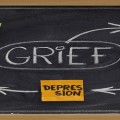
After the fog lifts and the finality of your loved one’s death sets in, many struggle with the belief that they have become depressed. We live in a society that expects someone to “get over it” quicker than we are capable. I see many survivors of a suicide loss criticize themselves for not moving forward in the allotted time that those around them expect, leading them to question whether they have become depressed. Even clinicians who are not educated in the world of grief will suggest that depression is the culprit. So are you depressed, or are you just grieving?
Grief and depression look very similar. I found a great article on Psychology Today that talks about the differences between the two. Dr. Michael Miller, editor of the Harvard Mental Health Letter and assistant professor of psychiatry at Harvard Medical School, said that with both grief and depression “People cry. They feel depressed. They’re having trouble sleeping. They may not have an appetite. They may not feel like doing anything. They may not take pleasure in anything.” With depression and grief looking so similar, it is important to understand the differences. Here are a few suggestions given by Dr. Joseph Nowinski to help differentiate between depression and grief.
- Expect to feel depressed. Loss of appetite, trouble sleeping, and sadness are all part of the normal grief process, and are best not interfered with.
- Expect grief to wax and wane over time. You may feel “fine” one day, only to slip back into deep grief the next day.
- Build and use a support network. Grieving individuals need others to talk to and to care for them not just for a few days, but over an extended period of time.
- If you experience thoughts of suicide, serious weight loss, or are unable to perform daily functions such as getting out of bed or going to work for more than an occasional day, consider seeking additional professional help.
To me, one of the most important things to remember is that grieving the loss of a loved one to suicide will make you feel depressed. It doesn’t mean you are depressed. Know that the pain that accompanies a traumatic loss is a normal response to the loss that you recently experienced. Most importantly, know that the pain you are feeling is a normal response to your situation. Can grief morph into depression? Absolutely. But, it doesn’t happen overnight.




This was really helpful. Thank you for sharing. I lost my younger brother/only sinking to suicide 7 months ago yesterday at the age of 33. I’ve never struggled with depression in my life, but I have had anxiety since my early 20’s. I’ve had multiple people tell me I need “more meds” or to see a different therapist because my “depression” isn’t getting better. All that I’m feeling seems natural to me and an appropriate response to losing someone to suicide. Some days are getting better and other days I’m back at square one. But, over the last 7 months I’ve never thought that my response was out of the ordinary. Thank you for this post. It affirms I’m just grieving and don’t need to treat anything. I just need to feel it and keep taking one day at a time. I love this site and read each and every article that shows up in my inbox. You guys are making a huge difference in people’s lives. Thank you. And sending lots of love and hope your way.
We are happy that you found us, and that our posts are helpful to you on your grief journey. I believe the first year is off limits when it comes to assessing for depression. After year one, if someone is still struggling, truly struggling, then we talk about depression. I think the best way to differentiate is with depression, a person struggles to experience any type of happiness or joy. With grief, a person still can experience joy and happiness, it just might not as be frequent as before the loss. While medication can help with depression, it will do little for grief. Unfortunately, we have to feel that pain:(.
Only sibling. Not sinking. Autocorrect ruins my writing!
I am coming up on the 3 month mark on June 15 of loosing my little brother. He would have turned 40 on June 20th. This article speaks volumes to most of my days right now. I try to put on a brave face, I try to seem as normal as possible, but my normal no longer exists. Trying to find a sense of who I am now and how my family will adapt to this huge, gaping hole and to how we will learn to live with the trauma, and loss that has been thrust upon us. Trying to find glimpses of happiness and light in a very dark and very sad time in our lives. Thank you for posting this article and the love and support this site shares.
The first 3 months almost don’t exist in my mind. We are in such a state of shock and disbelief that the reality of the loss hasn’t quite set in. I always tell my clients that around month 3 or 4 it feels like the bottom gives out. Reality sets in, and we are left feeling lost in this new world we are living in. It is not easy to mourn a loss by suicide. Know that it takes time. Often longer than we think, or others deem appropriate. It is a process. Be kind to yourself.
Thankyou for writing this blog. I find it very pertinent after losing my youngest son 7 months ago to suicide 1 day shy of his 21st birthday. My experience has been that people do assume that you are depressed when really we are having a natural response to losing our loved one. This is grief and it is unpredictable. Good days, bad days and just really down days. Normal human emotions in the journey of the loved ones affected by the loss of someone to suicide.